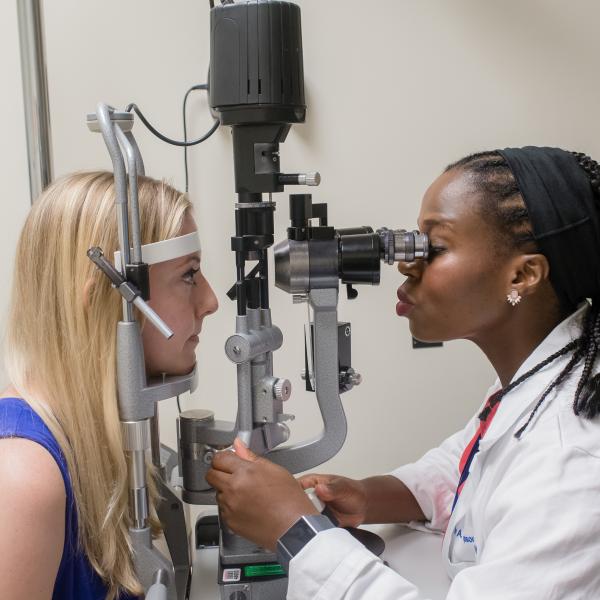How Do You Know You Have a Detached Retina?

At a glance: Retinal Detachment
-
Symptoms:
A sudden increase in floaters (pocket-sized nighttime spots or squiggly lines that float beyond your vision), flashes of light in one heart or both optics, a "curtain" or shadow over your field of vision
-
Diagnosis:
Dilated centre exam
-
Treatment:
Laser treatment, surgery
If you have symptoms of retinal detachment, go to your centre dr. or the emergency room right abroad. Retinal detachment can cause permanent vision loss — but getting treatment right away can assistance protect your vision.
What is retinal detachment?
Retinal detachment is an center problem that happens when your retina (a light-sensitive layer of tissue in the back of your eye) is pulled away from its normal position at the back of your eye.
What are the symptoms of retinal detachment?
If only a small role of your retina has discrete, you may not have any symptoms.
Just if more of your retina is detached, yous may not be able to see as clearly as normal, and you may notice other sudden symptoms, including:
- A lot of new floaters (small-scale dark spots or squiggly lines that float across your vision)
- Flashes of calorie-free in one eye or both eyes
- A dark shadow or "drape" on the sides or in the center of your field of vision
Retinal disengagement is a medical emergency. If you lot take symptoms of a detached retina, information technology'due south of import to go to your eye md or the emergency room correct away.
The symptoms of retinal disengagement often come on rapidly. If the retinal detachment isn't treated correct abroad, more of the retina can disassemble — which increases the risk of permanent vision loss or blindness.
Am I at risk for retinal detachment?
Anyone tin have a retinal detachment, but some people are at higher risk. Y'all are at higher take chances if:
- You or a family member has had a retinal disengagement before
- You've had a serious center injury
- Y'all've had eye surgery, like surgery to treat cataracts
Some other issues with your eyes may likewise put y'all at higher run a risk, including:
- Diabetic retinopathy (a condition in people with diabetes that affects blood vessels in the retina)
- Extreme nearsightedness (myopia), especially a severe type called degenerative myopia
- Posterior vitreous detachment (when the gel-like fluid in the center of the eye pulls away from the retina)
- Sure other eye diseases, including retinoschisis (when the retina separates into 2 layers) or lattice degeneration (thinning of the retina)
If you're concerned most your run a risk for retinal detachment, talk with your eye doctor.
What causes retinal detachment?
There are many causes of retinal detachment, only the most mutual causes are aging or an heart injury.
There are 3 types of retinal detachment: rhegmatogenous, tractional, and exudative. Each blazon happens considering of a different problem that causes your retina to movement away from the dorsum of your center.
How can I prevent retinal detachment?
Since retinal disengagement is often caused by aging, there'southward often no way to foreclose it. Only yous can lower your risk of retinal detachment from an eye injury past wearing rubber goggles or other protective centre gear when doing risky activities, like playing sports.
If yous experience any symptoms of retinal disengagement, go to your eye medico or the emergency room right away. Early on treatment tin can help foreclose permanent vision loss.
Information technology's as well of import to get comprehensive dilated eye exams regularly. A dilated center examination can help your centre doctor find a pocket-sized retinal tear or detachment early, earlier information technology starts to touch on your vision.

Did y'all know?
Retinal detachment tin can happen to anyone
If you take an centre injury or trauma (like something hitting your middle), it'south important to see an center medico to check for early signs of retinal detachment
Seeing a few floaters (small-scale night spots or squiggly lines) in your vision is normal — merely if you suddenly see a lot more floaters than usual, it'southward important to become your optics checked right away
How volition my eye doctor bank check for retinal detachment?
If you see any warning signs of a retinal detachment, your eye medico tin check your optics with a dilated eye exam. Your md will give you lot some eye drops to dilate (widen) your pupil and then expect at your retina at the back of your eye.
This test is usually painless. The dr. may printing on your eyelids to check for retinal tears, which may exist uncomfortable for some people.
If your center md still needs more information afterward a dilated center exam, you may go an ultrasound or an optical coherence tomography (OCT) scan of your eye. Both of these tests are painless and can assist your eye medico run into the exact position of your retina.
What's the treatment for retinal detachment?
Depending on how much of your retina is detached and what type of retinal detachment you have, your eye doctor may recommend light amplification by stimulated emission of radiation surgery, freezing handling, or other types of surgery to set any tears or breaks in your retina and reattach your retina to the back of your heart. Sometimes, your centre physician will use more than i of these treatments at the same time.
![]()
Freeze treatment (cryopexy) or laser surgery. If you have a small-scale hole or tear in your retina, your dr. can use a freezing probe or a medical light amplification by stimulated emission of radiation to seal any tears or breaks in your retina. Y'all can ordinarily get these treatments in the eye dr.'southward office.
Learn more about laser surgery and freezing treatment
Treatment for retinal detachment works well, especially if the disengagement is defenseless early on. In some cases, you lot may demand a 2nd handling or surgery if your retina detaches again — but treatment is ultimately successful for about 9 out of x people.
Final updated: December 18, 2020
Source: https://www.nei.nih.gov/learn-about-eye-health/eye-conditions-and-diseases/retinal-detachment
0 Response to "How Do You Know You Have a Detached Retina?"
Post a Comment